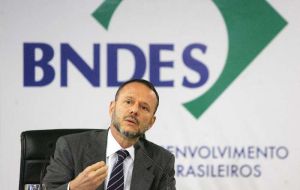MercoPress. South Atlantic News Agency
Brazilian development bank lending level and rates triggers controversy
 BNDES President Luciano Coutinho
BNDES President Luciano Coutinho Brazil’s state development bank President Luciano Coutinho rejected criticism that record lending is placing a burden on the central bank to keep inflation in check and slowing the reduction of public debt.
Coutinho said lending at the bank, known as BNDES, which rose 41% in the first five months of the year to 46 billion reais (25.9 billion USD), is helping increase investment and boost production in Latin America’s largest economy, which is needed to keep prices stable.
“Going forward, our expectation is to share the burden between BNDES and the market,” Coutinho said in a July 2 interview in Paris. “But we need to do that gradually. If BNDES pulls out abruptly, the cost of capital for investment will increase a lot.”
Record BNDES lending at interest rates lower than the market’s is drawing increasing criticism as policy makers seek to slow inflation amid forecasts the economy will expand this year at the fastest pace in decades
Central bank President Henrique Meirelles, in an interview with Valor Economico newspaper published Monday said that the development bank’s lending may push rates higher because it reduces the efficiency of monetary policy.
Brazil’s economy will expand 7.2% this year after contracting 0.2% in 2009, according to the median forecast of about 100 economists in a central bank survey Monday.
The growth rate is beautiful music for President Lula da Silva and the candidate he nominated to succeed him in next October’s election, Dilma Rousseff. Lula da Silva is campaigning hard to transfer his prestige and record popular support to his former cabinet chief Dilma, an efficient bureaucrat but with no electoral experience.
“The continued quasi-fiscal stimulus through the BNDES is contributing to high credit growth,” Shelly Shetty, head of Latin America in Fitch’s Sovereigns team, wrote in a report. It’s “placing an additional burden on monetary policy to curb excess domestic demand pressures and preventing a faster reduction in the gross general government debt burden.”
BNDES lending has a positive fiscal impact because tax revenue resulting from increased output is higher than the subsidies on the loans, said Coutinho, who ruled out an increase in the bank’s 6% long-term interest rates, known as TJLP.
“If you add to TJLP risk spreads, other spreads, the rate goes up to 8.5, 9, 10 percent,” he said. “It’s a very high real interest rate for the long-term investment, then there’s no reason for me to increase TJLP.”
Brazil’s policy makers, led by Meirelles, raised the country’s main overnight rate to 10.25% on June 9, the second consecutive increase since April and a similar decision is expected for this month.
In line with these expectations Brazil’s Bovespa stock index fell for the first time in three days on concern higher borrowing costs will slow economic growth.
The Bovespa stock index lost 0.9 percent to 60,865.27. Forty-five stocks dropped on the index while 18 rose. U.S. markets were closed for the Independence Day holiday. The real slipped 0.4% to 1.7799 per dollar Monday from 1.7721 Friday.
Brazilian policy makers will raise the benchmark interest rate to 12/13% by year-end, up from a week-earlier forecast of 12%, according to the median estimate in a July 2 central bank survey of about 100 economists.




Top Comments
Disclaimer & comment rulesCommenting for this story is now closed.
If you have a Facebook account, become a fan and comment on our Facebook Page!